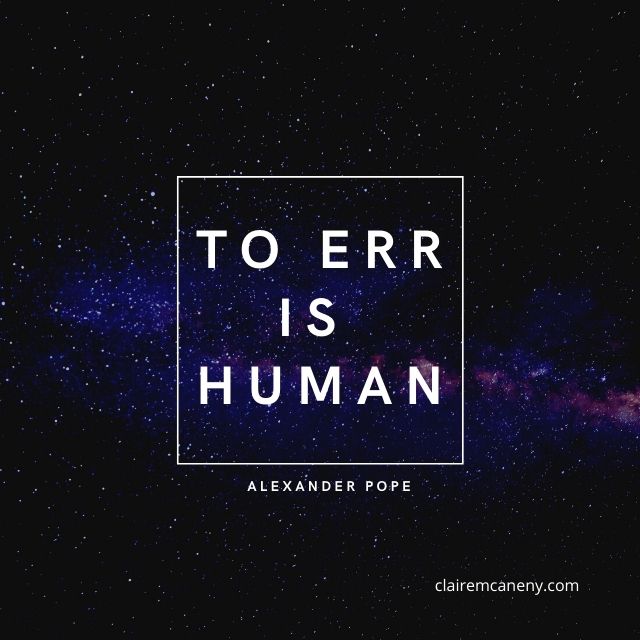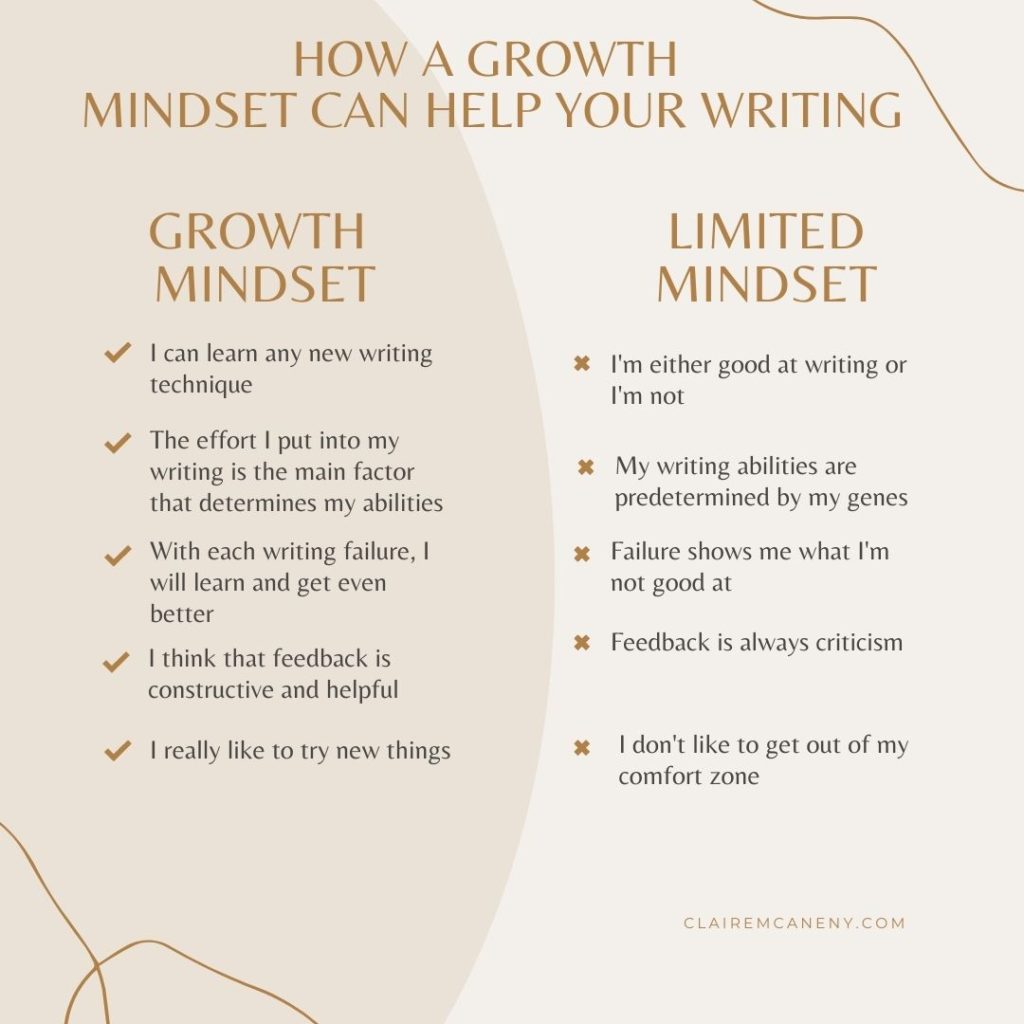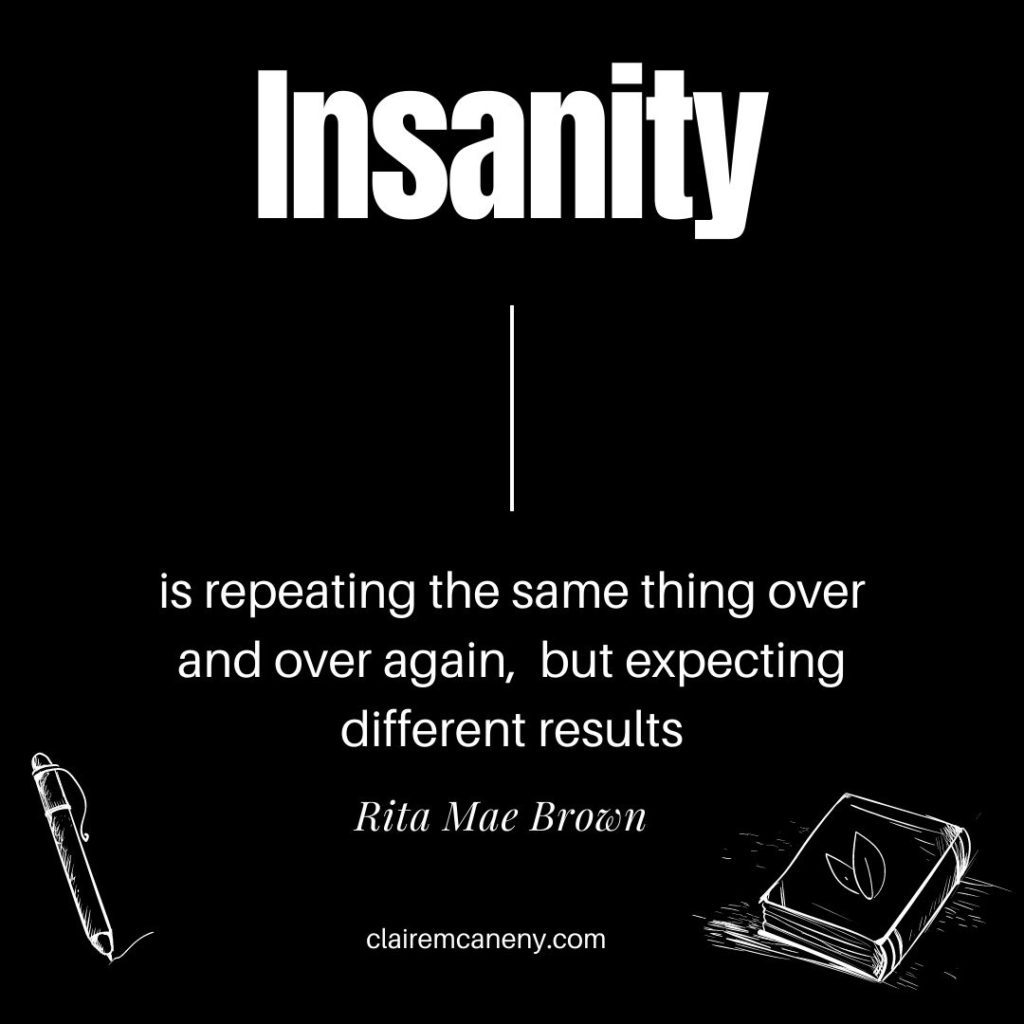Are you scared to make mistakes when you write?
I am not going to be talking about grammar, spellings or sentence structure. I am not going to talk about plot or if you should be planning or ‘pantsing’ your novel. These are not mistakes. These are all just part of the writing process. So I do not consider these mistakes.

Why is it important to learn from your mistakes?
Mistakes are a way of letting us know that we have more to learn. For me I am reframing this to look at it from the point of view that there is so much to know about writing that I will never get bored or fed up and there is potential for years and years of a fulfilling writing career. Imagine if we knew it all after only one book or one piece of writing? That is not enough of an incentive to keep sitting down at the desk and writing day after day.
As we develop as writers we will make mistakes and we need to be ready to learn from them.
Developing a growth mindset as a writer
It is important for writers to believe that they can improve by learning techniques and strategies. This is a growth mindset where the energy is put into learning and not just on the end result. Progress needs to be measured so that achievement can be recognised and that learning a lesson about the technique e.g. are you a planner or a pantser is just as important as the outcome.
If you have been forced to listen to the concept of a growth mindset and are entirely fed up of it this is an interesting article from Carol Dweck herself about what it actually is and how it has been distorted by some people.
The inspiration for this blog post came from a Tim Ferris interview with Neil Gaiman. Neil Gaiman has written many books including Coraline, Stardust and Good Omens. There are so many takeaways in this interview that I will definitely be referencing it again in more blog posts. He made a mistake when he was young that he was able to learn from and that helped him when he was working as a journalist. My take away from this story was make as many mistakes as you can at the start so you can learn the most when less people are reading your work. Then your early work can be compared to your later work as an example of how your writing has matured and grown. (Anybody else getting ready to have their work discussed by lecturers? Just me then.)

We learn from our mistakes
I am really good at repeating this phrase as a teacher of a practical subject. Especially electrolysis, a fascinating treatment involving tiny, thin needles the width of a hair that need to glide into the follicle beside the hair that is still in there. A lot of dexterity and practice is needed as well as a lot of patience for the extremely fiddly fine work and concentration.
It was from teaching this class over the years that I was able to fully understand how only the students who had bad days were able to really learn and develop confidence in their abilities. Especially when it came to the practical exam. In a stressful situation they were able to fall back on the times they made mistakes in class and still succeeded.
But it was only when students were stuck or struggling that they asked for help. Any of the students who thought they were doing ok or did not really have bad days often ended up developing bad habits or not fully understanding how to treat the awkward hairs that are hard to see under the magnifier. When they hit stress it was very hard for them to handle because everything always went right for them before now so they did not know what to do when something went wrong.
Recent Challenges
I have been teaching for 16 years now and one of the changes that I have seen is that people have become more critical of themselves. Students expect so much more when they are trying something for the first time. Monitor what you are exposing yourself to. The clips of people making mistakes can often be funny but are you subconsciously taking on the message that you will be judged and laughed at for not immediately being competent at a new skill? What has been your previous experience with learning and mastering a new skill? How much time were you given to become good at it? How patient was the person who was teaching or helping you?
Are the ‘Grammar Police’ a reason you are afraid to make mistakes?
Have you seen too many people correct the grammar in a tweet or facebook post? These ‘Grammar police’ are often on power trips, needing to put other people down to make themselves feel superior. They are bullies. And I have no time for them. Research has been conducted to discover the personalities of the people who are happy to be called grammar police. Unsurprisingly, they are inflexible and not sympathetic to others. Kat Morris also wrote a great article about grammar police here that is worth reading.
Often, what is being corrected is the differences in sentence structure that happens because of regional variations. Listening to podcasts is a great opportunity to understand more about your own voice and accent. I have a rural Irish accent and when I was growing up there were very few presenters on Irish radio or television with my accent. They were all from Dublin and had a specific way of speaking.
Beware of Perfectionism
Is it perfectionism that is causing you to change your behaviour so that you avoid making any mistakes? Perfectionism is when you believe that taking no action is better than making a mistake and risking yourself. I wrote a blog post about how to recognise when perfectionism is preventing you from writing.
‘Don’t self identify with the mistake’
An important aspect of mistakes is to make sure that you understand that you are not your mistakes. Patrice Washington has a podcast where she address’s this with her guest Melissa Fredericks. It is called ‘The Grace to Try’.
What is a writing mistake?
So, I have gone through the benefits of learning from mistakes but what am I calling a writing mistake? Anything that makes you feel bad and causes you pain. Especially if it makes it hard to write again the next day. This could be writing for five hours without taking a break for food or drink. It could be holding your hand at an awkward angle that causes pain and means you can’t write the next day.
I am currently trying to figure out how to correct my posture while I am sitting at my desk to prevent neck pain. Building a sustainable writing routine needs to take into account the ergonomics required for writing. If you are going to take your writing seriously you need to prepare your writing space in such a way that you are not going to be physically injured while you are writing.
Rebecca Rowland wrote a great article about the specific ergonomic requirements for writers here.
What is not a writing mistake?
As I said at the start the following are not mistakes, they are part of the process and will be either fixed in later drafts or by a beta reader or editor. You might start writing on your own you need help from other people before the book, story, novel is ready to be sold.
Spellings. These can be helped with autocorrect. But if you are writing a fantasy novel with different spellings for names and places then autocorrect will have its limits. Especially when it already cannot handle Irish names and places!
Sentence structure or phrasing. There are different ways of getting your message across or communicating more clearly what you want to say but the words have to go down on the page first so that you can rearrange them later.
When you are writing you are focusing on more than just the rules of grammar or how the words are spelt. I don’t know about you but at the young age of 11 when the teacher was trying to get us to learn grammar I made the conscious decision that I was only going to learn it when it became relevant to me (the universe is definitely laughing now). Grammar in school is not interesting to everybody.
Reframe what happened (Action Steps)
Forgive yourself for making the mistake.
Put it the mistake into context. Did you know that this technique, writing style etc was going to be difficult before you started? Often, if we know it is going to be difficult we are more patient with ourselves. We stay calm when the mistake happens and staying calm allows us to be patient with ourselves and improve.
If we expect it to be easy we give up the first time it does not go right. Also the whole point of the electrolysis example is that everyone makes mistakes, they are a vital part of learning.
Learn from the mistake
If you don’t like the feeling of making the mistake then put effort into learning the lesson that the mistake is trying to teach you. Brushing past the mistake and trying to ignore it means it will happen again. If it does happen again it simply means there is more to be learned. It is from Patrice Washington that I learned the idea that when we look at our experiences we decide if it was a lesson or a blessing.
Journal about making the mistake
Is this your first time making this mistake or have you made other versions of this mistake before? Was it something that you were corrected for by a teacher – possibly in front of the class? So many of our feelings around writing are established in school with the reaction of our teachers. I wrote about this in another blog post.
Get Help
Asking for help could involve listening to a podcast or buying a book. Especially if this is your first time trying not to criticise yourself. If you are trying to be more active in improving yourself reaching out to someone can be difficult. You have to admit to someone else that you need help and it is not easy to admit when we do not know something.

Now that you are ready to change your mindset about mistakes. How are you going to change your behaviour or habits to minimise the chances of it happening again?
You might not find the solution that works best for you the first time. You might need to repeat the mistake again to adjust and retry.
0 Comments on “Are you scared to make mistakes when you write?”